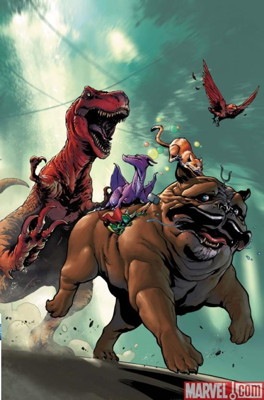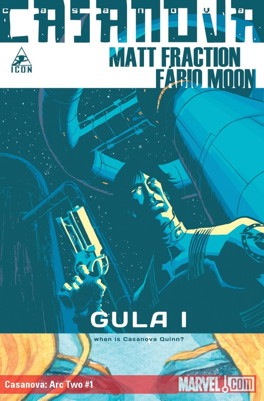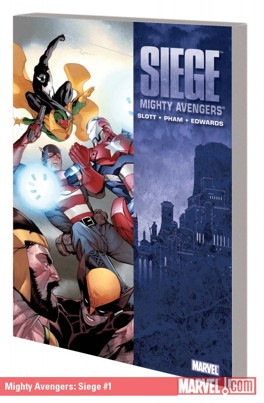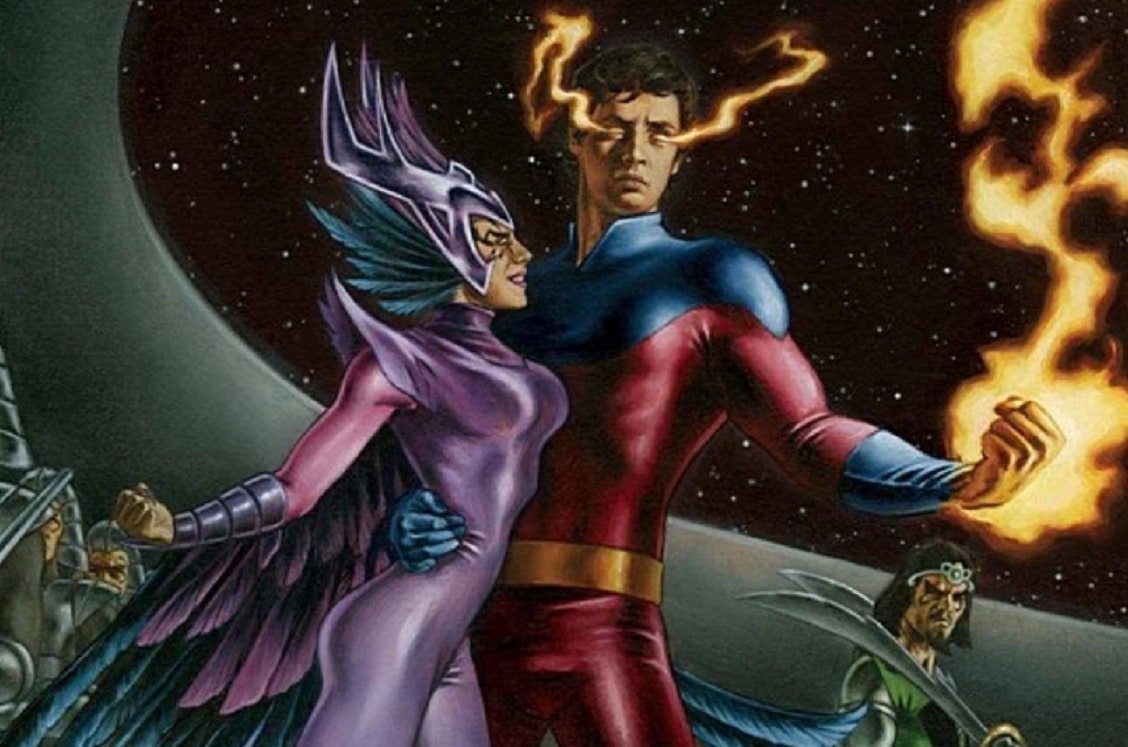[In recent weeks there’s been much discussion of comics pricing, and both Marvel and DC have made changes to their pricing levels in order to face the realities of the current economic climate. While DC has announced an across the board roll-back of prices from $3.99 to $2.99, Marvel’s policy announcements have been somewhat less clear. At the ICV2 conference last month Sr. Vice President Sales & Circulation David Gabriel announced a rollback on selected titles, but no details. In addition at a retailer meeting, Marvel announced that they would be putting out fewer titles. An interview earlier this week with VP-executive editor Tom Brevoort made it clear that the rollback was limited but left details to Gabriel.
In order to clear up what Marvel’s policies are in regards to pricing, Gabriel and Chief Operating Officer Jim “Ski” Sokolowski sat down for an interview, discussing some of the business realities of publishing, the growth of digital and how to reach new readers as older ones cycle out.]
THE BEAT: Just to give this some background, at the ICv2 digital conference and Diamond retailer breakfast you made some statements about pricing changes at Marvel and there has been controversy about just what that announcement entailed. So can you explain the details of the price rollback?
DAVID GABRIEL: The pricing structure is that for limited series in the Marvel Universe that we roll out, we will price as many of those as we can for $2.99 for a 32 page book.
THE BEAT: What would be the factors that would affect whether they can be priced at the lower price?
GABRIEL: If someone has 30 pages they want to put into those stories or [special issues], especially a one-shot, those will be at $3.99 as they have been. If there is back up material, the book will be at the higher price. If a series is already is in the works, again, we never made any announcement that we were lowering prices on series that were out already. If the first issue has been solicited at $3.99, the second issue will be at $3.99. There’s not a strict policy thing that we’re lowering everything to $2.99 but there will be pricing structures that will help everyone stay profitable.
THE BEAT: So with a marquee title like a Spider-man or Avengers, it would be at the higher price point so everyone can make as much money as possible, if the sales warrant it.
GABRIEL: Yes, and where we did listen to retailers and the industry months back, most people will agree that that is an okay pricing strategy. I’ve never heard anybody argue about that. Where I have heard them argue is that if we have too many titles coming out at that price, some of the bottom titles that aren’t marquee titles are going to get dropped. Some of the other titles that we want people to sample, that aren’t necessarily the marquee titles, are still going to get stomped on a bit. The titles that people aren’t testing or trying them out. They are the first ones people won’t pick up, if they are a non-marquee title, at $3.99 and we definitely recognize that we need to fix something on those books. Bringing back $2.99 for limited series, that’s where we started that program.
This is for limited series in the Marvel Universe. We’ve got limited series that are third party licensed books, they will stay at $3.99 and the Ultimate line is still our marquee line—it’s staying where it is. There may be a few limited series that will still get extra pages or have back-up features—I know there’s one coming in March that will be $4.99 but it will be 44 to 48 new pages of story, with two stories in each issue. So we are testing that as well.

THE BEAT: At the same time you are lowering the number of book you are publishing. What is the thinking behind that?
GABRIEL: Again, that was a response mostly to retailers saying there is just too much product out there. There is someone who said that to Ski the next morning [after the retailer breakfast], screaming at him. We took a look at the overall schedule and there were a few too many books out there and we started making cuts. You started seeing them in November and December. Some titles are going away, some are altering to help sales a bit. But the thing you don’t see is stuff that was scheduled that we’ve taken out and pushed out towards the end of the year or just killed altogether. And I didn’t went to do that. It takes money out a lot of our creators pockets, they are the guys who get dinged…it’s very hard for me to cancel my friend Jim McCann’s book. But that’s sort of the reality. We had to look at the books that are doing the best and those aren’t necessarily the books that are reviewed the best.
THE BEAT: Let me take you back a bit to ask about the general market for sales. We’ve seen a lot of online pundits like John Jackson Miller taking about the trends, but you guys obviously see the accurate figures. What are the trends that you’re seeing that make you more concerned about the size and pricing of your line? There have been a lot dire warnings and dire interpretations out there.

THE BEAT: Marvel has always been seen as a little more harsh—your cancellation number is a bit higher than other publishers. Even if these are fan favorites books. So is there still a way to grow a different audience for these books?
JIM SOKOLOWSKI: The Sense and Sensibilities, the Oz books, The Marvel Illustrated projects, we’re staying by those. We understand we have to try some different things all the time to test the market but you reach a point when you’re just not getting any traction. A year ago forecasting numbers was pretty straightforward, and issue 1 hits x, issue 2 hits % of x and down, sometimes up….over the year that structure has changed. We’ve had to stay on top of that change and David has a good track record on that basis.
THE BEAT: Another element everyone has been very curious about is digital. David, you mentioned this and some of Tom Brevoort’s comment suggested that Digital was allowing a new revenue stream that was making it possible to make up for some of this lost revenue. Can you talk about digital comics and how they are affecting this?
GABRIEL: You basically said it right there. It’s a revenue stream that we didn’t have 8 or 9 months ago. We are doing day and date books and we haven’t really done a lot of them. We are testing the water. Today, we had a little glitch — a new day and date book that went up and then went down. [Ultimate Thor #2 briefly was on sale a week early yesterday.] But there is revenue now that we’re able to tie that in to the economics of some of the regular printed copies. I think I said this at the digital meeting we are all at the beginnings of figuring out digital comics. I’m not going to lie to you and say we have all the facts. If we don’t have all the facts, they are probably not out there yet. I say that only because we have been doing this for at least three years with a digital subscription online. We’ve been doing the app stuff for quite a while now too, since April or May. But it’s all going in a positive direction and it’s all helping. It was probably a month before the digital conference that we started looking at the pricing. And we are up in digital sales and we started to think how can we use that to our advantage in the print sales.
SOKOLOWSKI: Everybody like to think that these books on the internet, well the digital stuff is free, so we should have a lot more so we can lower our price on print comics to practically nothing because that’s all sheer profit. And yes we don’t have paper, printing and binding costs. But yes there are costs—we have a division that runs digital media. We have to take and convert the files to what we call “smart paneling” so it will work on various devices and none of them do it the same way, so you have to do it four times. So it has a cost.
GABRIEL: And the creators are getting paid for digital comics as well.
THE BEAT: You say it’s trending upwards in general?
GABRIEL: Certain titles are working really well in the app. It’s a lot of the titles that you think. The ones that are selling well in comics shops are also the ones that are doing well in digital. But that’s not always the case.
SOKOLOWSKI: There are ones that come out of the blue, and you say how did THAT happen?
GABRIEL: I don’t want to give away the secrets of the top sellers. We’re still struggling and learning how to market and promote it. And I think we’ll get there pretty soon.
SOKOLOWSKI: And there are tools that we need in the app. That’s development time. We’ll say yes, that’s on our list to add. But should we do this first or that first? And yeah, do the other things first. You get into a constant waiting game of “wouldn’t it be cool to see that?”
THE BEAT: It seems to me a lot of what your talking about is keeping the comics shops going in what’s a very difficult environment for retail and the economy in general. My own observation is that everybody blames event fatigue. But I think we have some reader fatigue, as well. I think a lot of the readers who came in with the Ultimate line ten years ago are naturally trending out or getting to the “I’m bored” phase. Are you concerned with this? Are there any specific method to get a new generation?

So we’re keeping on with the Marvel Adventures books. We’ve found the semi-successful way to put out all-ages titles that didn’t die right on the vine and that’s worked fairly successfully for 2 or 3 years now. And those books get repurposed in every way imaginable going into libraries, Wal-Marts and Scholastic book fairs and everything that we can there. It’s still difficult. We’ve got the greatest marketing machine behind us with the movies, the Iron Man movie with Thor and Captain America. But I think where everybody still falls short is converting those movie goers into comics readers. And we’ve got some stuff cooked up with Thor coming out that we’ll hopefully be able to finally test the waters on how you get movie goers as readers, whether it be digitally or into comics shops. That’s another good way to grow the industry.
SOKOLOWSKI: We’ve been looking at digital and calling it the new newsstand. It’s really become a place where you can sample material. Between the movies and the iPAd and the app there’s this huge sampling opportunity and we have over 2 million apps downloaded. Then you start looking at how many people go back religiously and how many are hitting the free reads every week vs. how many are buying the new releases every week and if we’re running a special you’re trying figure out how to keep them interested and is this the perfect selection for them and how do you tie it all together. And then how do you get them into a store.
THE BEAT: Speaking of stores Marvel comics are now sold in Disney Stores in theme parks. I wonder how that program is going?
GABRIEL: That’s sort of also in its infancy. I would hate to call it so much of a program as it’s sort of an outreach of some newsstand and some Diamond selling in there. It hasn’t matured yet.
SOKOLOWSKI: David recently just got involved with them on product mix.
THE BEAT: [laughs] I can imagine some of the suggestions you may have made on what not to carry. [General laughter.] I know both you guys are creative publishers, not just bottom line guys although obviously it has to come into play. But you look at something like Kick-Ass —clearly the movie helped it, but it ‘s been a huge publishing success for you this year. How do you keep that door open? Would Marvel consider launching new print lines or digital lines?
GABRIEL: Well, yeah. We’re launching the new CrossGen Line, we’ll see how that does. But, that’s very different from Kick-Ass.
SOKOLOWSKI: You have to give Mark [Millar] credit for Kick-Ass and not just for conceiving it and his work with Johnny on it. The guy’s a shameless and the best self-promoter ever. This guy can get you talking about him if you don’t even know he exists.
GABRIEL: We have initiatives coming out, still a ways off, that are along the lines of what you are talking about with just digital formats to test that out. We’ll have some incentive programs with retailers with digital later on, in the not too far future.
THE BEAT: Sometimes I miss this kind of stuff, but as the Heroic Age was the theme for 2010, has a theme for 2011 been announced yet?
GABRIEL: Not yet. The Point One stuff is not a theme but it’s trying to get more readers back into the stores. But then I think about three weeks from now there will be sort of a shocking theme that you will see announced. And part of that theme will be something nobody would have thought you’d ever see from us.
THE BEAT: She’s a man, baby!
GABRIEL: We’ve done that!
[Thanks to Arune Singh at Marvel for setting up this interview.]









Surely he means “marquee” and not “marquis,” right? The lack of sales strength in those non-marquee titles is pretty worrying because most of my favorite Marvel titles either hover toward the bottom of the sales chart or have already been cancelled, stuff like Nova, Guardians of the Galaxy, and Incredible Hercules. I’m just glad Cap and X-Factor are still selling well!
Interesting interview, and it’ll definitely be interesting to see how the pricing shakes out. I will say I was indeed one of those individuals who like Incredible Hulk, but not enough to keep paying $3.99 for it. Having been out of it for months now, I’ve kind of permanently lost interest in getting back into it.
“We had to look at the books that are doing the best and those aren’t necessarily the books that are reviewed the best”
I don’t understand what this means. Does this mean that Marvel is more interested in selling any old book, as long as it sells lots, than in putting out quality?
Hats off to these guys for the most effort ever in a backpeddle.
Marvel, the $3.99 price became “sort of a barrier” to me staying with CAPTAIN AMERICA, THOR, the AVENGERS titles, and possibly INVINCIBLE IRON MAN and FANTASTIC FOUR in the near future. Any chance you could drop those prices as well?
I’m just glad that I’m a DC fan.
“Yes, and where we did listen to retailers and the industry months back, most people will agree that that is an okay pricing strategy. I’ve never heard anybody argue about that.”
Really? No retailers or industry people argued that $3.99 would be a bad strategy? NO ONE??
Wow. That’s some blinders right there.
It does seem unusual for a publisher to price issues of series at $3.99 because “that’s what readers will pay,” based on inelastic demand. That’s more of a monopolist mentality than it is pricing material to the market norm, as with books and magazines. There’s also, still, the question of value for money. A comic that can be read in ten minutes or less, whether it’s priced at $2.99 or $3.99, is still a worse deal in some ways than other forms of entertainment, such as videos and video games. The high price of comics is a barrier in itself to attracting new readers.
SRS
Marvel definitely seems to have selective hearing. I love that bit about retailers begging Marvel to reduce the price on HULK, but only HULK.
Still, a man hears what he wants to hear and disregards the rest
“I’m just glad Cap and X-Factor are still selling well!”
At this point X-Factor is the only regular series at Marvel I’m still reading in monthly format. I get nervous that the price will go up and make me reconsider.
And what about collection prices? Recent FANTASTIC FOUR and IRON MAN hardcovers have had just four issues worth of content for $19.99 (not including tax, more than 40% more expensive than just picking up the single issues). Worse, the recent INCREDIBLE HULK: World War Hulks hardcover was $19.99 for just three issues of new content! In the past, picking up a hardcover or trade would be cheaper than the individual issues…
There is NO VALUE in picking up these collections, which are priced seemingly without consideration of quality or quantity. At least with the FF collections, Hickman puts in the extra effort to design something worth owning – the rest are dumped onto the stands, the already-paid-for content slapped into cookie-cutter packaging.
And then there is the maddening inconsistency of deluxe collection pricing… The first Brubaker CAP Omnibus is 25+ issues for #75, a reasonable value. The Brubaker/Fraction/Aja IRON FIST Omnibus is just 14 issues for $75. The recent JMS THOR Omnibus is $65 for about 20 issues. The Fraction/Lorocca Iron Man deluxe hardcover is less than $40 for 19 issues (a great value for a superb story)!
And none of this scratches the surface on Marvel’s incomprehensible strategy for what they choose to keep in print and available to the direct market.
This is all nuts! Folks need to look away from the cover price on their floppies for a second and look at the price tag on their trades and start demanding some more consistency, logic, and VALUE in THAT department. While there may not always be individual issues of comics, the trade is more likely to endure and cause hair-pulling over pricing in the future.
Jeffrey O. Gustafson
I *can’t believe* anybody is saying “Keep the Nomad series in the back of Captain America to keep that at $3.99”.
Show me those retailers so I can avoid their stores!
I actually don’t mind paying the extra buck for Nomad…
“I *can’t believe* anybody is saying “Keep the Nomad series in the back of Captain America to keep that at $3.99″.
Show me those retailers so I can avoid their stores!”
What, you don’t like paying an extra dollar for a back-up NO ONE demanded?!? LOL
It seems the approaches by DC and Marvel are like this,
DC: Lower cost of titles line wide and expect more sales by fans snatching up the cheaper books.
Marvel: Cut the number of titles – that will save money on production costs – and hope the fans will transfer their money into the Marvel books not being cut.
“I don’t understand what this means. Does this mean that Marvel is more interested in selling any old book, as long as it sells lots, than in putting out quality?”
Of course. They are a business with shareholders to answer to, not a non-profit organization. Why would this shock anyone? Regardless of anyone’s subjective view of a particular book’s “quality”, an Avengers title that sells 90,000 monthly will stay around, while an Atlas book that sells 20,000 will not.
Anyone ever notice when any executive of Marvel refers to page count they say 32 pages? This of course is misleading because that number includes ad pages and not stand alone story content. A bit misleading.
It’s just my pet peeve.
The Tiki
To the guys commenting on Nomad as the backup in Cap:
Marvel execs ( I think Breevort but can’t remember for sure) said previously that Cap would have gone up to $3.99 even if they hadn’t added Nomad as a backup.
They added it as the bone to throw to the fans.
You’d be paying that price no matter what in the end.
One beneficial change in the way story ideas are generated would be to change the frame of reference. Instead of thinking, “What can I have _____ do that would be interesting?” as a soap opera scriptwriter would, think “What would be a good story?” and then fit the character into it, modifying the plot as needed. Many SF stories, after all, are based on scientific concepts that are intriguing, revolutionary, or both, and happen to be about scientists or adventurers. Just tracking developments in genetics, psychology, cosmology, etc. should result in more story ideas than one can use for years.
Perhaps the simplest way to reinterpret a character would be to keep the character’s personality and abilities the same, but to change his surroundings. If Tony Stark had a sister, brother, several siblings or parents to compete against or feud with, the stories would be different without changing the basic character at all. If Superman had family ties to be concerned about, his stories would be different as well.
SRS
I just don’t believe anything Marvel says. I will go by what I see in the solicits. And I’ve been going away from what I’ve seen.
If the cover price is too high, I’ll wait for the reviews and decide to get the HC/TPB. If the trade is too high, I’ll look for a second hand copy. This is not getting the product into the most hands. And this is going to destroy the direct market.
I’d gladly pay $3.99 for Marvel to give me a monthly Captain America title WITHOUT a Nomad backup. ;)
Seriously, you’ve got an amazing supporting cast on that title, and the only thing you can come up with is a “kid-friendly” Nomad backup. Bah. (I don’t even read the backup at this point.)
I’m torn, personally. I’ve gotta say I think I buy two DC comics. They just aren’t putting out anything that catches my interest. So the large majority of titles I buy are Marvel (though many of them suck, so I’m not sure what’s going on in my head. Hello, Avengers, I’m talkin’ to you!) BUT I’d really like to support DC’s price reduction move, and show Marvel that by not following I’m not gonna be buying their titles. But that would be a HARD move for me to make…
sigh. Torn, so very torn…
So Marvel are only reducing 1 existing title to 2.99, as appossed to DC’s entire line?
And only SELECT minis are going to be 2.99 ie – the ones they think will sell poorly.
Its a shame really, I’d love to be reading more Marvel titles (I too only pick up X Factor) – Like Brubaker’s Captain America and Secret Avengers, and Heinberg’s Young Avengers… actually, thats all I can think of.
And there goes my chance of reading new Crossgen books! If they arn’t 3.99 I’ll be in shock! ….
There are plenty of websites that offer new, recent, and pre-order comics and TPBs for much less than cover price. No reason to pay anywhere near $3.99 for your comics, unless you reeeeally love your local retailer.
Comments are closed.